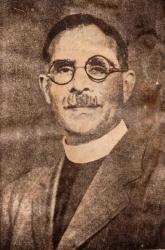M
 ubasher Ejaz Gill is a man of Gad and also a man of society, carefully observing and engaging with the social and religious issues facing the Christian community of Pakistan. He is a contemporary writer and a poet who has in the last few years made his mark among the literary elite of Pakistani Christians by making significant contributions primarily to magazines like Humsukhan and Qasid-e-Jadeed. Indeed his articles have also appeared in other Christian magazines and national news papers.
ubasher Ejaz Gill is a man of Gad and also a man of society, carefully observing and engaging with the social and religious issues facing the Christian community of Pakistan. He is a contemporary writer and a poet who has in the last few years made his mark among the literary elite of Pakistani Christians by making significant contributions primarily to magazines like Humsukhan and Qasid-e-Jadeed. Indeed his articles have also appeared in other Christian magazines and national news papers.
Gill has exposited on some very important, though controversial theological issues, like Sabbath and Easter. His article Sabbath abdi eh'd was published in two parts in Qasid-e-Jadeed. This is, in my view a well written article and for those who believe Sabbath is the Seventh-day of the week (Saturday) it has some powerful arguments. Doctrines which have different theological interpretations are often difficult to address with sensitivity, however, this article is an eloquent proof that this is an art which Gill has mastered. It also is a proof of his extensive Biblical study as the piece is studded with Biblical texts and historical references, which makes the reader stop and think more than once. (q.v. Qasid-e-Jadeed, February 2010, and March 2010).
Ejaz Gill's understanding of the history of Christian church is also worth mentioning here. He has penned several articles in this area, only a couple will be referred here to serve as examples. Bible ka neya sal, (Qasid-e-Jadeed (February 2009), and 325 ka inqlab (Qasid-e-Jadeed March 2009).The former is a comparative study of various lunar and solar calendars and how these relate to the Christian calendar, while the latter is an incisive look into the historic reasons for the term Easter, often used to describe the celebratory event of Lord Jesus Christ's resurrection. This article is a polemic against the use of word Easter to celebrate the resurrection of Lord Jesus Christ. Gill believes that "Easter", originally referred to a pagan goddess. It is of utmost importance here to note that he believes in the victorious resurrection of Lord Jesus Christ, and of His victory over the grave, but disagrees that this historic event should carry the name of a pagan goddess. His argument is against the name of the celebration and not against the validity or the significance of the event.
On the socio-political front Gill assesses the historical trends effecting all Pakistanis generally, and minorities, and especially the Christian minority particularly. Around the time when the Pakistani nation was busy preparing for 62nd celebrations of Pakistan's Independence day (August 14, 1947), his article, Arz-e Pak mayree azadi kehan hai? (published in various newspapers and magazines, q.v. Humqlam vol 1. no.2, July/August 2010), was an eye-opener for any one who cared to read it. It was aimed at both the ruling elite and also the majority that feel that Pakistan is their exclusive homeland, and that only they love her. Gill pointed from the pages of history and the scared texts of the Bible that Christians were responsible and patriotic citizens of Pakistan, and yet left to ask the questions pertaining to their treatment in their own homeland.
As the tide of history moves on with its usual twists and turns, with its uncanny defiance for predictability, I am reminded of the saying "There is no holiday from history", and I feel safe to state here that as long as we have watchful observers like Ejaz Gill, no significant event of history, or any debate arising out of it, will go unnoticed, unrecorded or uncommented by our writers.
 ubasher Ejaz Gill is a man of Gad and also a man of society, carefully observing and engaging with the social and religious issues facing the Christian community of Pakistan. He is a contemporary writer and a poet who has in the last few years made his mark among the literary elite of Pakistani Christians by making significant contributions primarily to magazines like Humsukhan and Qasid-e-Jadeed. Indeed his articles have also appeared in other Christian magazines and national news papers.
ubasher Ejaz Gill is a man of Gad and also a man of society, carefully observing and engaging with the social and religious issues facing the Christian community of Pakistan. He is a contemporary writer and a poet who has in the last few years made his mark among the literary elite of Pakistani Christians by making significant contributions primarily to magazines like Humsukhan and Qasid-e-Jadeed. Indeed his articles have also appeared in other Christian magazines and national news papers. ubasher Ejaz Gill is a man of Gad and also a man of society, carefully observing and engaging with the social and religious issues facing the Christian community of Pakistan. He is a contemporary writer and a poet who has in the last few years made his mark among the literary elite of Pakistani Christians by making significant contributions primarily to magazines like Humsukhan and Qasid-e-Jadeed. Indeed his articles have also appeared in other Christian magazines and national news papers.
ubasher Ejaz Gill is a man of Gad and also a man of society, carefully observing and engaging with the social and religious issues facing the Christian community of Pakistan. He is a contemporary writer and a poet who has in the last few years made his mark among the literary elite of Pakistani Christians by making significant contributions primarily to magazines like Humsukhan and Qasid-e-Jadeed. Indeed his articles have also appeared in other Christian magazines and national news papers.
